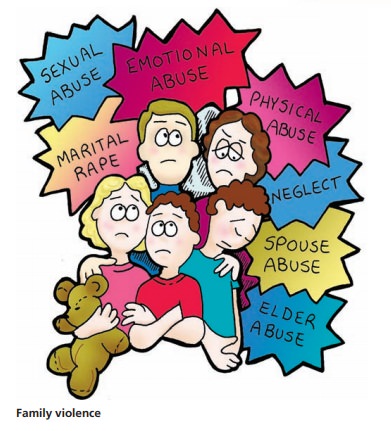Chapter: Psychiatric Mental Health Nursing : Abuse and Violence
Clinical Picture of Abuse and Violence
CLINICAL PICTURE OF ABUSE AND
VIOLENCE
Victims of abuse or violence certainly can have physical injuries
needing medical attention, but they also experi-ence psychological injuries
with a broad range of responses. Some clients are agitated and visibly upset;
others are withdrawn and aloof, appearing numb or oblivious to their surroundings.
Often, domestic violence remains undis-closed for months or even years because
victims fear their abusers. Victims frequently suppress their anger and
resentment and do not tell anyone. This is particularly true in cases of
childhood sexual abuse.
Survivors of abuse often suffer in silence and con-tinue to feel
guilt and shame. Children particularly come to believe that somehow they are at
fault and did some-thing to deserve or provoke the abuse. They are more likely
to miss school, are less likely to attend college, and continue to have
problems through adolescence into adulthood. As adults, they usually feel guilt
or shame for not trying to stop the abuse. Survivors feel degraded, humiliated,
and dehumanized. Their self-esteem is extremely low, and they view themselves
as unlovable. They believe they are unacceptable to others, contami-nated, or
ruined. Depression, suicidal behavior, and marital and sexual difficulties are
common (Child Wel-fare Information Gateway, 2008).

Victims and survivors of abuse may have problems relating to
others. They find trusting others, especially authority figures, to be
difficult. In relationships, their emotional reactions are likely to be
erratic, intense, and perceived as unpredictable. Intimate relationships may trigger
extreme emotional responses such as panic, anxi-ety, fear, and terror. Even
when survivors of abuse desire closeness with another person, they may perceive
actual closeness as intrusive and threatening.
Nurses should be particularly sensitive to the abused client’s need
to feel safe, secure, and in control of his or her body. They should take care
to maintain the client’s personal space, assess the client’s anxiety level, and
ask permission before touching him or her for any reason. Because the nurse may
not always be aware of a history of abuse when initially working with a client,
he or she should apply these cautions to all clients in the mental health
setting.
Related Topics